Malaysia has surpassed Thailand to become the second-largest auto market in Southeast Asia, after Indonesia, according to the NIKKEI Asia on Wednesday.
This significant development comes as Southeast Asia becomes a fiercely competitive battleground for Asian automakers.
Nikkei Asia’s analysis of industry data reveals Malaysia’s sales figures surpassing Thailand’s for three consecutive quarters, ending in March 2024.
Malaysia’s success can be attributed partly to government stimulus packages. Sales tax exemptions for domestically produced vehicles fueled growth for national brands Perodua and Proton, commanding roughly 60 per cent of the market.
The fulfillment of tax-free bookings even after the exemption’s end in mid-2022 kept figures buoyant in 2023.
New model launches, including competitively priced electric vehicles, further spurred sales, stated the Malaysian Automotive Association.
Meanwhile, Thailand, once known as the Detroit of Asia, has seen a decline in sales. This slump started last June and continued into the first quarter of 2024, with a 25 per cent year-on-year drop.
Factors contributing to this include rising non-performing auto loans and stagnant consumer spending. However, the entry of Chinese EV manufacturers is causing a shift towards electric vehicles in the Thai market.
Indonesia, despite being the regional leader, also faces challenges. Rising interest rates have dampened consumer enthusiasm, leading to a 24 per cent decrease in first-quarter sales compared to the previous year.
Vietnam’s auto market also reflects a slow economy, with first-quarter sales dropping 16 per cent year-on-year. A surge in demand spurred by reduced registration fees for domestic cars in December couldn’t sustain positive figures in the following months.
The Philippines stands out as the sole country with a positive growth rate, at 13 per cent in the first quarter. This can be attributed to eased inflation and continued strong consumer spending.
As competition from Asian automakers intensifies in Southeast Asia’s growing middle-class markets, government subsidies and overall economic conditions are expected to play a crucial role in determining future sales trends.
While the Malaysian Automotive Association predicts a 7.5 per cent decline in total vehicle sales for 2024, the growth of hybrid and electric vehicle sales is anticipated.


